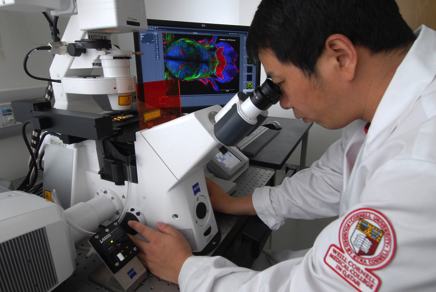May 2009

WCMC-Q recently instituted two on-site review boards to check the
legal, ethical and scientific standards of research involving human
subjects.
While the possible benefits of stem cell, genetic and other edgy therapies challenge the imagination, the legal and ethical implications around their discovery have to be monitored. And when research involves human subjects, studies are exposed to the utmost scrutiny. In the US, this happens through an oversight panel known as the Institutional Review Board (IRB).
The IRB was set up by US federal regulations to check physical and psychological risks in research on human subjects by ensuring all investigators involved in research meet the highest ethical standards and comply with all applicable regulations, including local law. Until now, any biomedical research done at Weill Cornell Medical College in Qatar had to be shuttled to and from the US for review. However, in anticipation of the growth projected for their research department, the school recently trained members to serve on a local IRB.
In addition to the IRB, WCMC-Q will also involve a Scientific Review Committee (SRC), which is a component of the IRB that evaluates research for sound design before it moves forward in the review process.
The incorporation of these panels meets a unique need in a country where researchers from all over the world, working with funding from an array of international sources, must be sensitive to local as well as any mix of global standards.
“So there’s local compliance, there’s international compliance, and if we do clinical trials on new drugs, there’s a whole host of USFDA regulations. There’s a whole host of FDA regulations if those drugs are to be approved in the US, and a whole host of EMEA regulations if we want them approved in Europe. All of that will fall under the same umbrella, because we can have people from anywhere doing research here,” said Farida Lada, director of research compliance at WCMC-Q.
WCMC-Q policy is based on US standards, and Lada says that there is a degree of flexibility to the rules that lend to their international application. While some rules are set in stone, other regulations are written as guidelines that can serve as the basis for rules built out into a local context.
“Our policies are essentially based on the US regulations. That’s the trend in a lot of new places that are starting their own oversight program now, for example Singapore and Korea have set up their programs so that they are mostly based on US regulations,” Lada said.
In some cases, the US guidelines will not be stringent enough to cover local requirements. In Qatar for example, the Ministry of Health requirements as well as local cultural requirements must be considered as regulatory points beyond the US regulations.
“One of the differences between here and the US is that when you enroll children as subjects in research in the US, depending on the risk of the study, it’s okay to get just one parent’s permission. Here we won’t allow that, because the culture here is very family-oriented, and that policy is really based on a local context and not what is normally required at an international standard. So one of the biggest issues is always making sure that the local context is considered,” Lada said.
Another challenge is making sure that all of the researchers are on board with the regulations. In the world of research compliance, Lada says she is often viewed as the police, but she hopes this will change in each case as researchers see she and her department are working for their benefit.
“We want to work with researchers so we can allow research to happen but in a compliant and ethical way.” Lada says.
Practically, having the IRB and SRC will greatly improve the efficiency of the compliance process around research happening at WCMC-Q while ensuring that it integrates local and international standards around the work being done.
“From a functional perspective, we have more control over the efficiencies. As a small organization, we can probably have a process that can be more flexible because we are not as big as the New York institutions. Whereas they are going to be going through hundreds of studies on a regular basis, we’re going to start off small so we can be very flexible for our investigators in our time frame,” Lada said. “We can allow research to start faster if we can review the research faster.”
Report by Emily Alp
